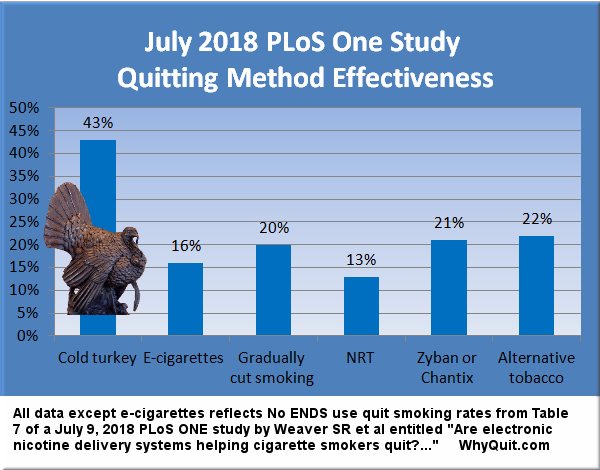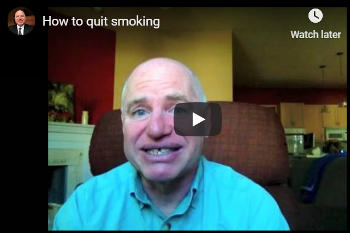
How to quit smoking
Watch almost 500 additional stop smoking videos
Entitled "How to quit smoking," this short YouTube video shares Joel Spitzer's top 16 tips on how to quit. I pray you take all 16 to mind and heart.
How to quit smoking? As Joel recommends, trust your natural instincts in letting go entirely!
If doubting them, take your own poll of all ex-smokers you know who have quit for at least one full year. What you'll find, as did a July 2013 Gallup Poll, is that cold turkey generates more long-term ex-smokers each year than all other quit smoking methods combined.[1]
In fact, the 2013 Gallup Poll found that only a tiny fraction of all successful quitters used approved products, just 8 percent. Imagine after 40 years and billions spent marketing nicotine gum (Nicorette), only 1% of successful ex-smokers crediting it, and only 2% crediting all prescription quitting products combined (nicotine nasal spray + nicotine inhaler + Zyban + Chantix = 2%).
As I asked in a November 19, 2013 letter published in the British Medical Journal, "How much closer to consumer fraud can approved products get?"
The question of how to quit smoking is really two questions: (1) what method to use and (2) tips on how to succeed at that method.
The first tip shared in Joel's video is to "quit cold turkey." The next 15 are tips on how to succeed going cold. The balance of this article is devoted to presenting evidence as to why quitting cold is an extremely wise decision.
Listen closely to quitting product commercials. Most either directly or indirectly bash and trash cold turkey. Why? Because they must. They know that the quitter's instincts are to stop smoking by going cold. They need to diminish confidence in those natural instincts. They must if they are to have any hope of convincing you to purchase their almost worthless magic cure, their nicotine gum, patch, lozenge, Zyban, Chantix, Champix or e-cigarette.
They also know that the natural confidence of smokers who previously went cold turkey and failed has already been seriously shaken. Instead of teaching them why their prior attempt failed and the cold turkey insights needed to succeed, they use and play upon that failure to help sell their product.
But then, is it fair to expect anyone with a direct or indirect interest in selling quitting products to tell smokers the truth, that cold turkey is how the vast majority succeed?
Although undisputed, you won't find reference to this simple truth on any quitting product website.[2] 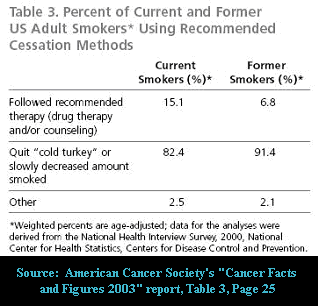 Instead, most will try to convince you that quitting without buying and using their product is nearly impossible.[3]
Instead, most will try to convince you that quitting without buying and using their product is nearly impossible.[3]
Nor will it be mentioned by any major health organization that accepts pharmaceutical industry contributions,[4] nor on any government health site with ongoing industry partnerships.[5]
But answering the question of how to quit smoking is broader than simply recognizing cold turkey as being the most productive quitting method. Which quitting method has the highest success rate?
The correct answer to the highest success rate question depends on how success is measured. More than 200 quitting product clinical trials measured success against users of placebo look-a-like products. Real cold-turkey quitters were never involved. There, quitting product users generally did 1.5 to 2 times better than participants given placebo products.[6]
But out here in the real world, placebo isn't a real quitting method. Although this may come as a shock, those using approved quitting products have failed to prevail over those quitting cold turkey in nearly every real-world population level quitting method survey conducted to date.[7]

For example, a 2006 study followed the smoking patients of 1,000 Australian family practice physicians. Not only did cold turkey quitters double the success rates seen among nicotine gum, nicotine patch, nicotine inhaler and Zyban quitters, cold turkey accounted for 1,942 of 2,207 of all successful quitters, a whopping 88% of all success stories.
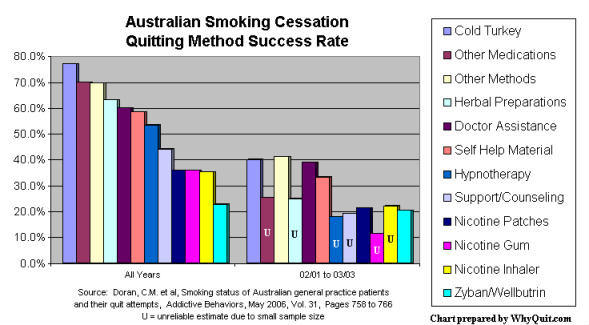
So how does the newest yet rather frightening magic cure, Pfizer's varenicline, compare? Varenicline is marketed as Chantix in the U.S. and Champix in the rest of the world. Although real-world performance data is treated as top secret, a 2008 Pfizer clinical study found "no significant differences" in the number of successful quitters when comparing varenicline to nicotine patch at 6 months or 1 year. That finding was echoed by a second 2010 patch versus Chantix study which found "no significant difference in abstinence rates was observed between the 2 groups over weeks 9-12 and weeks 9-24."
If no more effective than nicotine replacement therapy (NRT) products, does it make sense to risk experiencing the long list of Chantix/Champix serious injury side effects, that include risk of death?
Smokers must either find a way to succeed at quitting, or expect diminishing health as smoke's 81 known cancer causing chemicals and hundreds of toxins gradually destroy and kill them. Ask yourself, are the few who succeed while using these products doing so because of having used them, or in spite of having done so?
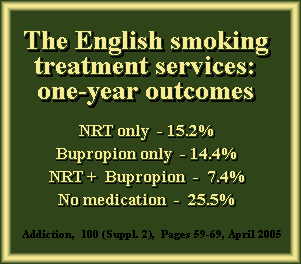 So why do quitting products prevail inside formal clinical trials yet fall flat on their face in real-world use? The primary reason (and there are many) is that most study participants were teased into joining clinical trials by dangling free quitting products in front of them. Most had lengthy quitting histories and hoped the product would diminish the intensity of withdrawal. The problem is that those 200 placebo-controlled clinical trials were not blind as claimed,[8] as experienced quitters had become experts at recognizing their withdrawal syndrome.[9]
So why do quitting products prevail inside formal clinical trials yet fall flat on their face in real-world use? The primary reason (and there are many) is that most study participants were teased into joining clinical trials by dangling free quitting products in front of them. Most had lengthy quitting histories and hoped the product would diminish the intensity of withdrawal. The problem is that those 200 placebo-controlled clinical trials were not blind as claimed,[8] as experienced quitters had become experts at recognizing their withdrawal syndrome.[9]
Would you have become frustrated if you'd joined hoping to receive three months worth of free nicotine lozenges and realized within 48 hours of quitting that you'd been given inert placebo lozenges instead? So did many of them, handing the product being tested an unearned frustrations victory.
As I suggested in a November 2008 letter published in the Canadian Medical Association Journal, testing quitting products against placebo is a licence to steal, as "chemical dependency may be the only known research area in which blinding is impossible."
But what about the big picture consequences of millions of smokers deeply believing in 3 decades of headlines generated by hundreds of placebo-controlled clinical trials? I wrote about two victims of sham placebo studies in November 2011, Neil age 53 and Helen age 50, members of Freedom and Turkeyville, WhyQuit's online support groups.
As I asked in a February 2012 letter published in the British Medical Journal, "If NRT is less effective long term than quitting without it, are quitters paying with their lives?" If so, should those who insist on generating additional sham science, or who grossly distort real-world survey findings, be held accountable for hundreds of thousands of needless deaths?
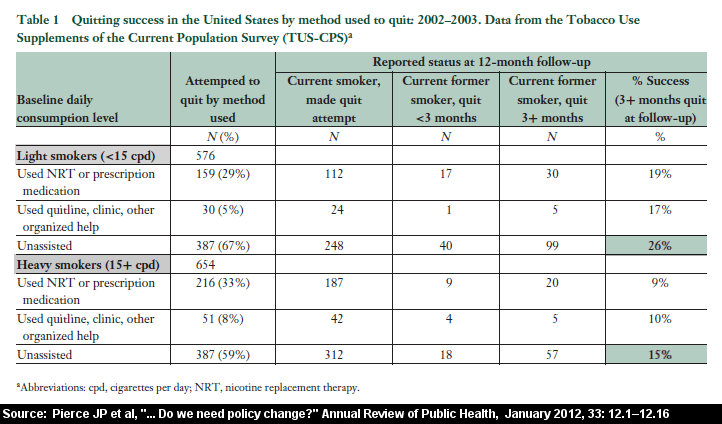
Can you sense my outrage? Sorry, I'm doing my best to hide it. Please forgive me. Back to cold turkey. Answering "cold turkey" to the question of "how to quit smoking" does not tell us the key or secret to successful cold turkey quitting.
The common thread among all successful cold turkey quitters is that they didn't allow any nicotine back into their bloodstream. The common thread among all who relapsed to smoking is that they did. My mentor Joel Spitzer refers to this as the "Law of Addiction."[10]
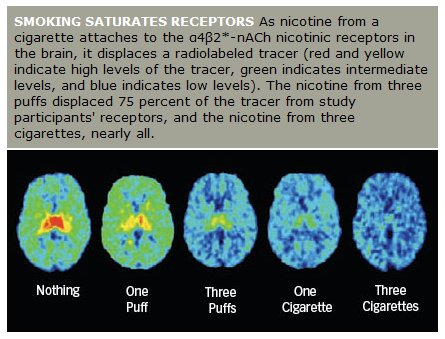
Research shows that just one puff and up to half of the brain's nicotinic-type receptors become occupied by nicotine.[11] Like alcoholism, nicotine addiction is a permanent disease, a brain wanting disorder.[12] While roughly half of quitters who try to cheat and smoke just once walk away thinking that they've gotten away with it, they soon find their brain wanting or even begging for more.
The wanting and desire felt following lapse is not a matter of a lack of willpower or weakness. It reflects the design, purpose and function of brain dopamine pathways, the mind's priorities teacher. It's their job to make activities which activate this circuitry nearly impossible, in the short term, to forget or ignore. It's why ending use of food or water is almost unthinkable.
We will never be stronger than nicotine's influence upon our mind's priorities teacher. But then, we don't need to be as nicotine is only a chemical with an I.Q. of zero. It cannot plot, plan or conspire against us, and is not some monster or demon that dwells within.
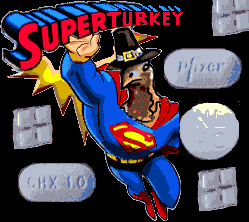 Attempting to quit without first learning how can be frightening. Our greatest weapon is our superior intelligence but only if put to work. Key to dramatically enhancing our odds of success is in becoming more nicotine dependency recovery savvy than our addiction is strong.
Attempting to quit without first learning how can be frightening. Our greatest weapon is our superior intelligence but only if put to work. Key to dramatically enhancing our odds of success is in becoming more nicotine dependency recovery savvy than our addiction is strong.
That being said, it may be best to learn as you go. Why? Two studies have found that unplanned quitting attempts are twice as likely to be successful as planned ones.[13] Why worry about some future quitting date and allow time to gradually erode your resolve before ever starting? Jump in the recovery pool! The water is great and roughly half find the going vastly easier than their chemically dependent brain kept telling them.[14]
As for learning, the Internet is loaded with wonderful free resources that transform cold turkeys into smart turkeys. For example, Joel's Library is home to more than 100 original articles on every stop smoking topic imaginable, to Joel Spitzer's free e-book "Never Take Another Puff," and to Joel's nearly 500 free video quitting lessons. Why quit afraid and alone in ignorance and darkness when we can turn on the lights?
If seeking support, give Turkeyville a visit. Home to more than 10,000 cold turkey quitters, Turkeyville is our Facebook group where the primary objective is to educate and support new quitters in getting off to a solid start.
One final quitting method warning. While gradual weaning, tapering and other cut-down schemes are highly tempting, they are also highly ineffective. A 2007 study found that cold turkey roughly doubles your odds over cut-down schemes. Even there, the doubling that occurred was generally among uneducated and unsupported cold turkey quitters.
But whether educated, supported or not, there's just one rule which if followed provides a 100 percent guarantee of success to all. It's just three simple words: no nicotine today! The next few minutes are all any of us can control and each is entirely do-able. Yes you can!
Breathe deep, hug hard, live long,
John R. Polito
Nicotine Cessation Educator
References
- Gallup. Most US smokers want to quit, have tried multiple times, 2013; also see, Chapman S and MacKenzie R The Global Research Neglect of Unassisted Smoking Cessation: Causes and Consequences, PLOS Medicine, 2010; also see Doran CM et al, Smoking status of Australian general practice patients and their attempts to quit, Addictive Behaviors, May 2006, Volume 31(5), Pages 758-766; also see Cheong Y, et al, Does how you quit affect success? A comparison between abrupt and gradual methods using data from the International Tobacco Control Policy Evaluation Study. Nicotine and Tobacco Research, August 2007, Volume 9(8), Pages 801-810.
- Chantix, www.Chantix.com; Nicorette, www.Nicorette.com, Nicoderm CQ, www.nicodermcq.com
- Polito JR Flawed research equates placebo to cold turkey, WhyQuit, 2007
- Helliker, K NICOTINE FIX - Behind Antismoking Policy, Influence of Drug Industry, Wall Street Journal, 2007; also see Polito JR, Great American Smokeout Hijacked, 2003
- Polito JR, Smokefree.gov really Buymeds.now, 2010
- U.S. Clinical Practice Guideline for Treating Tobacco Use and Dependence, June 2000
- see, Polito JR, GlaxoSmithKline Continues Defrauding Smokers, 2010
- Mooney M, The blind spot in the nicotine replacement therapy literature: Assessment of the double-blind in clinical trials, Addictive Behaviors, 2004, Volume 29, Pages 673-684, also see, Polito JR Smoking cessation trials, Canadian Medical Association Journal, 2008; also see Polito JR, Widespread Blinding Failures Put Validity of Nicotine Replacement Studies in Serious Question, 2004
- Perkins, K. A., et al, Nicotine discrimination in male and female smokers, Psychopharmacology (Berl), 1994, Volume 116(4), Pages 407-413; also see, Perkins, K. A. et al, Influence of training dose on nicotine discrimination in humans, Psychopharmacology, 1996, Volume 126(2), Pages 132-139; also see, Perkins, K. A., et al, Nicotine discrimination and self-administration in humans as a function of smoking status, 1997, Psychopharmacology (Berl), Volume 131(4), Pages 361-370.
- Spitzer, J, The Law of Addiction, 1988
- Brody AL et al, Cigarette smoking saturates brain alpha 4 beta 2 nicotinic acetylcholine receptors, Archives of General Psychiatry, August 2006, Volume 63(8), Pages 907-915.
- Polito JR, Addiction to smoking nicotine a mental illness and disease, 2010
- Ferguson SG, et al, Unplanned quit attempts--results from a U.S. sample of smokers and ex-smokers, Nicotine & Tobacco Research, July 2009, Volume 11(7), Pages 827-832, and West R and Sohal T., "Catastrophic" pathways to smoking cessation: findings from national survey, British Medical Journal, February 2006, Volume 25;332(7539), Pages 458-460.
- Chapman S and MacKenzie R The Global Research Neglect of Unassisted Smoking Cessation: Causes and Consequences, PLOS Medicine, 2010
